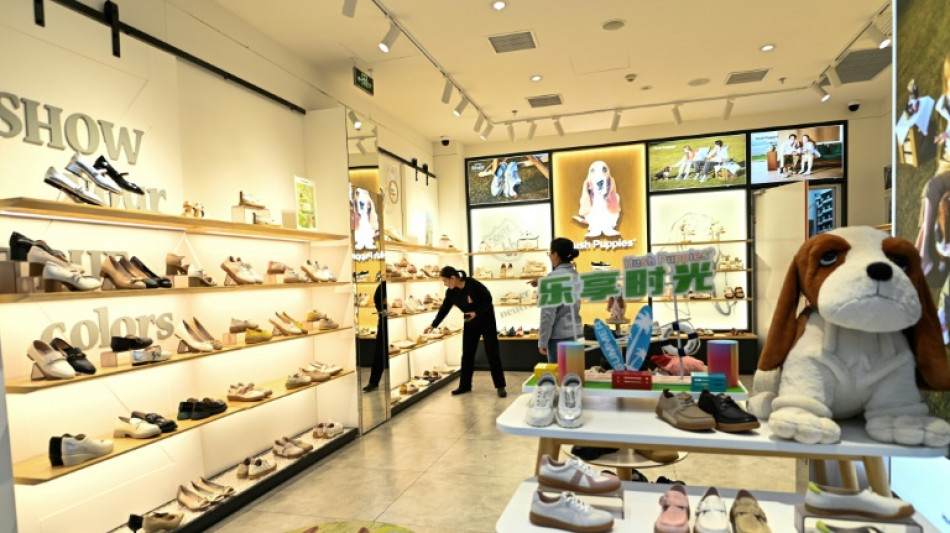
-
 No Grand Slam Track in 2026 till athletes paid for 2025: Johnson
No Grand Slam Track in 2026 till athletes paid for 2025: Johnson
-
Macron decries antisemitic 'hatred' after memorial tree cut down

-
 'Doomsday' monsoon rains lash Pakistan, killing almost 200 people
'Doomsday' monsoon rains lash Pakistan, killing almost 200 people
-
Arteta hits back at criticism of Arsenal captain Odegaard

-
 Leeds sign former Everton striker Calvert-Lewin
Leeds sign former Everton striker Calvert-Lewin
-
'Obsessed' Sesko will star for Man Utd says Amorim

-
 Deadly monsoon rains lash Pakistan, killing nearly 170
Deadly monsoon rains lash Pakistan, killing nearly 170
-
Lyles hints at hitting Olympic form before Thompson re-match
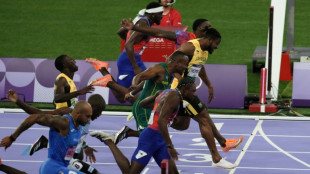
-
 Italian authorities try to identify Lampedusa capsize victims
Italian authorities try to identify Lampedusa capsize victims
-
UK king, Starmer lead VJ Day tributes to WWII veterans, survivors

-
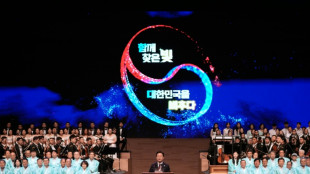 South Korean president vows to build 'military trust' with North
South Korean president vows to build 'military trust' with North
-
Macron vows to punish antisemitic 'hatred' after memorial tree cut down

-
 Hodgkinson happy to be back on track ahead of Tokyo worlds
Hodgkinson happy to be back on track ahead of Tokyo worlds
-
Deadly monsoon rains lash Pakistan, killing dozens

-
 Frank urges 'real' Spurs fans to back Tel after racist abuse
Frank urges 'real' Spurs fans to back Tel after racist abuse
-
Japan's emperor expresses 'deep remorse' 80 years after WWII

-
 Chelsea boss Maresca eager to sign new defender as Colwill cover
Chelsea boss Maresca eager to sign new defender as Colwill cover
-
Liverpool target Isak controls his Newcastle future: Howe

-
 New-look Liverpool kick off Premier League season after spending spree
New-look Liverpool kick off Premier League season after spending spree
-
Football and falls as first humanoid robot games launch in China
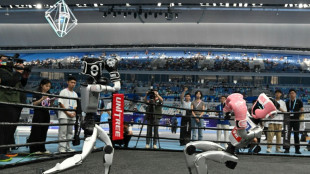
-
 'Like hell': Indoor heat overwhelms Saudi Arabia's cooks, bakers
'Like hell': Indoor heat overwhelms Saudi Arabia's cooks, bakers
-
On VJ day, king pays tribute to UK veterans, warns of war's 'true cost'
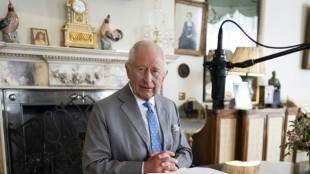
-
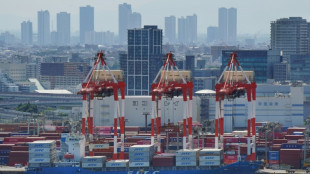 Stocks mostly higher before US-Russia summit
Stocks mostly higher before US-Russia summit
-
Bayern's Bundesliga crown up for grabs after rocky summer

-
 Arsenal face revamped Man Utd as new-look Liverpool open Premier League season
Arsenal face revamped Man Utd as new-look Liverpool open Premier League season
-
South Korea president vows to build 'military trust' with North
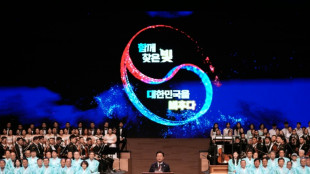
-
 'Never again': Indigenous Bolivians sour on socialism
'Never again': Indigenous Bolivians sour on socialism
-
Indonesia's president touts economy, social welfare drive
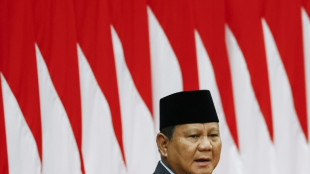
-
 World plastic pollution treaty talks collapse with no deal
World plastic pollution treaty talks collapse with no deal
-
Facing US tariffs, India's Modi vows self-reliance
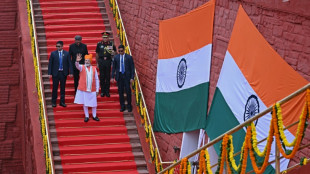
-
 Trump to meet Putin in high-stakes Alaska summit
Trump to meet Putin in high-stakes Alaska summit
-
Indian rescuers scour debris after 60 killed in flood

-
 Ivory Coast village reburies relatives as rising sea engulfs cemetery
Ivory Coast village reburies relatives as rising sea engulfs cemetery
-
Stressed UK teens seek influencers' help for exams success

-
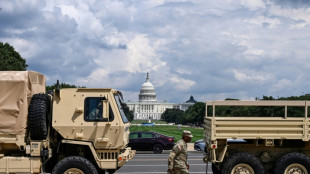 National Guard deploys 800 personnel for DC mission, says Pentagon
National Guard deploys 800 personnel for DC mission, says Pentagon
-
Japan emperor expresses 'deep remorse' 80 years after WWII

-
 With waters at 32C, Mediterranean tropicalisation shifts into high gear
With waters at 32C, Mediterranean tropicalisation shifts into high gear
-
Historic Swedish church being moved as giant mine casts growing shadow

-
 Malawi's restless youth challenged to vote in September polls
Malawi's restless youth challenged to vote in September polls
-
Indonesian roof tilers flex muscles to keep local industry alive

-
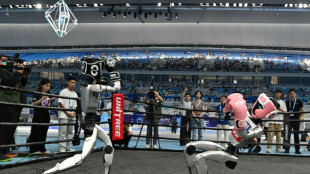 World's first humanoid robot games begin in China
World's first humanoid robot games begin in China
-
Scott Barrett returns to lead All Blacks against Argentina

-
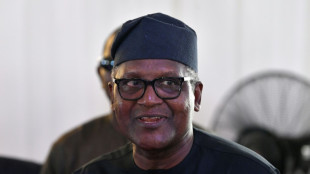 Five things to know about Nigeria's oil sector
Five things to know about Nigeria's oil sector
-
New compromise but still no deal at plastic pollution talks
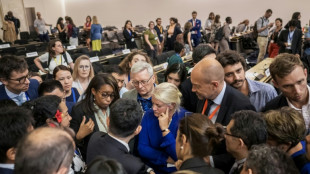
-
 France's Cernousek seizes lead at LPGA Portland Classic
France's Cernousek seizes lead at LPGA Portland Classic
-
Putin-Trump summit: What each side wants
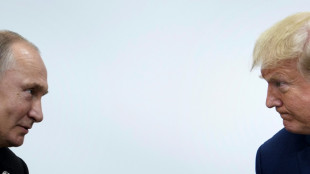
-
 Desperate Myanmar villagers scavenge for food as hunger bites
Desperate Myanmar villagers scavenge for food as hunger bites
-
Qualifier Atmane stuns Rune to set up Sinner semi-final in Cincinnati

-
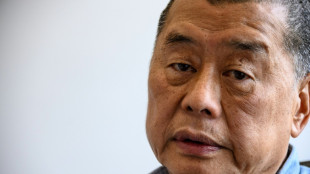 Hong Kong tycoon Jimmy Lai's security trial delayed over health concerns
Hong Kong tycoon Jimmy Lai's security trial delayed over health concerns
-
Asia stocks mixed before US-Russia summit
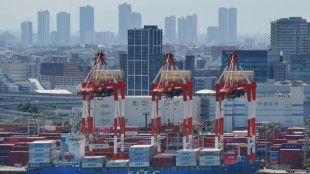
| RBGPF | 0% | 73.08 | $ | |
| CMSC | 0.4% | 23.182 | $ | |
| BCC | 0.28% | 86.86 | $ | |
| SCS | -0.34% | 16.145 | $ | |
| BTI | -0.85% | 56.935 | $ | |
| GSK | 0.21% | 38.8853 | $ | |
| NGG | -0.15% | 71.455 | $ | |
| BP | 0.75% | 34.4 | $ | |
| CMSD | 0.26% | 23.35 | $ | |
| RYCEF | -2.33% | 14.61 | $ | |
| RELX | 0.19% | 47.78 | $ | |
| BCE | 0.26% | 25.435 | $ | |
| VOD | 0.13% | 11.655 | $ | |
| AZN | 0.34% | 78.74 | $ | |
| JRI | 0.4% | 13.33 | $ | |
| RIO | 0.66% | 61.445 | $ |

China seeks to 'tariff-proof' economy as trade war with US deepens
China is trying to tariff-proof its economy by boosting consumption and investing in key industries, but analysts say it remains critically vulnerable to the economic storm triggered by Donald Trump's 104 percent levies on its goods.
Beijing has vowed to "fight to the end" against Trump's aggressive trade policy, with number two leader Li Qiang saying authorities were "fully confident" in the resilience of the Chinese economy.
But even before the tariffs hit, weakness in the post-Covid domestic market, rising unemployment and a long-running property crisis had all dampened consumption.
"The Chinese economy has been significantly weakened since Trump's first term and can't really withstand the impact of sustained high tariffs," said Henry Gao, an expert on the Chinese economy and international trade law.
Overseas shipments had represented a rare bright spot last year, with the United States the top single country buyer of Chinese goods.
US figures put Chinese exports to the United States at around $440 billion in 2024, almost three times the $145 billion worth of imports.
Machinery and electronics -- as well as textiles, footwear, furniture and toys -- make up a majority of the goods sent, and a supply glut could squeeze already crowded domestic consumer markets.
Although China's domestic market is stronger now than in Trump's previous term, there would inevitably be pain ahead, said Tang Yao from Peking University's Guanghua School of Management.
"Certain products are specifically designed for American or European markets, so efforts to redirect them to domestic consumers will have only a limited effect," he said.
- 'Strategic opportunity' -
However, a weekend editorial in the Communist Party-backed People's Daily described the tariffs as a "strategic opportunity" for China to cement consumption as the main driver of economic growth.
We must "turn pressure into motivation", it read.
Beijing has been seeking to "recast structural external pressure as a catalyst for long-intended reforms", said Lizzi Lee from the Asia Society Policy Institute's Center for China Analysis.
Authorities are "projecting confidence", she said.
China's quick and coordinated response to tariffs reflect lessons learned from Trump's first term, she added.
For example, in addition to readying reciprocal tariffs on US goods set to come into effect Thursday, Beijing's commerce ministry the same day announced export controls on seven rare earth elements -- including ones used in magnetic imaging and consumer electronics.
Beijing's response to any further escalation may no longer be confined to tit-for-tat levies, as China is "refining its retaliatory approach", Lee said.
Since Trump's first term, China has diversified and fortified relationships with countries in Europe, Africa, Southeast Asia and Latin America, as well as South Korea and Japan.
Beijing could also expand government support for the private sector as entrepreneurs fall back into President Xi Jinping's good graces, added ANZ's Raymond Yeung.
China's leaders have been trying to promote domestic self-reliance in technology for some time, offering explicit support and reinforcing supply chains in key areas like AI and chips.
- 'No real protection' -
While this time round Beijing has more experience with Trump, it "doesn't mean the Chinese economy can easily shake off the effects of soaring tariffs", said Frederic Neumann, chief Asia economist at HSBC.
Authorities will be looking to quickly offset falling US demand for Chinese goods, he said.
That could look like trade-in schemes or more consumer subsidies that make it easier for Chinese shoppers to buy common household items, from water purifiers to electric vehicles.
"By creating demand and trade opportunities for China's partners in Asia and Europe, the country could help shore up what's left of the liberal global trading order," Neumann said.
But whether or not Beijing can do that is yet to be seen.
The government has "been very reluctant to introduce real consumption stimulus, which is why there's such low confidence in any so-called consumption-boosting measures", Gao said.
"I don't think China has any real protection against a trade war," he added.
Success also goes beyond words, and ultimately hinges on Beijing's ability to deliver the long-awaited consumption boost, HSBC's Neumann warned.
"This is China's moment to seize economic leadership of the world," he said.
"But that leadership will only come about if domestic demand rebounds and fills the void left by an absent US."
I.Matar--SF-PST
